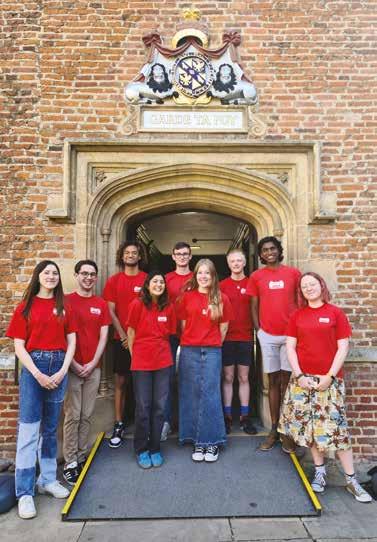
5 minute read
From the Senior Bursar
College Finances And Investments
The financial year of 2022–23 (1 July 2022 to 30 June 2023) is the first not to include an element of Covid-19 related government restrictions. Thus, as we compare it to the previous financial year (which was subject to some restrictions), there are large increases in both income and expenditure reflecting positive changes as everyday life in College and more generally economic activity is returning to ‘normal’. For example, our students were able to be in residence throughout the year and equally, the College’s commercial property rental income recovered from the very tough impact of the pandemic and at last, some conference activity (in summer 2022) was possible once again.
However, the invasion of Ukraine in February 2022 and the consequential significant rise in inflation has led to immediate pressures on the cost of delivering College services, as energy, food, construction, and labour-related costs form the basis of College expenditure. Staffing costs have also risen significantly against a backdrop of a shortage of key labour in professional services and hospitality. To support our staff, the College enhanced the general Higher Education sector’s pay settlement by giving two additional bonuses and staffing costs have increased by 23% when compared to the previous year reflecting this significant wage growth. The College also responded to the cost-of-living crisis for our students by increasing bursaries by 10% to ensure students in the most financial need had their maintenance income increase with inflation.
Given the impact of inflation and the consequential interest rate policy by central banks on investment markets, the College endowment had performed relatively well by the end of the financial year. The endowment consists of broadly two portfolios, half in commercial property and the other half in global securities. Income performed well and it averaged an overall investment composite strong positive return over the year. The size of the endowment, including new donation capital, increased from £94m to £101m at the start of the year.
The problem for the College, and indeed other Cambridge Colleges and more generally universities, is that it’s proven impossible for growth of income to match the unavoidable cost increases. The College’s revenue (unrestricted) financial account is in deficit, and this is forecast to continue in the short term. Thus, if income over the next year is negative then general reserves will have to be used to fund the gap. We are making real efforts to streamline services without harming the student experience and the College is also examining ways to enhance different income streams.
The College is fortunate to have a relatively diversified income stream, and this includes income from its long-term endowment, tuition fees, provision of residential accommodation to students, commercial conferences, and donations from Members. All together this amounted to £15m over the course of the 2022–23 financial year.
College income grew by over 17% when compared to 2021–22 but it should be noted that this sum does include £1.8m of capital donations for investment in the endowment. Tuition fee income has been largely stable throughout and since the pandemic. However, this having been a normal academic year, income from student rents has increased as has the demand for College catering which resulted in large increases for these two income streams. Income from our Endowment has largely recovered and pleasingly largely held up despite turbulent financial markets in 2022 arising from inflationary concerns. Conference activity returned in summer 2022 although only at modest levels when compared to pre-pandemic activity. Our total philanthropic income from Members was hugely positive this year and we are enormously grateful for the continued generosity. Support was received for student welfare, the Magdalene Bursary Scheme, buildings, and gardens with a particular emphasis on the significant forthcoming restoration project of the Pepys Building.
College Expenditure
College expenditure increased to £13.5m and was more than 15% higher than the previous year. The College increased its spending on teaching, tutorial support and student welfare by more than £800,000 and this included a full year of additional costs for the New Library. This increase obviously reflects the return to normal academic activities at Magdalene and the increase of every bursary awarded by 10% to reflect rising living costs but also the sometimes steep rise in prices for all types of expenditure.

The costs of running the College estate have increased very substantially as global inflation seriously impacted energy and maintenance costs. Catering costs grew enormously with both strong demand from resident Members and from food price inflation and rising labour costs due to the considerable shortages in hospitality staff.
Although the pace of inflation is expected to fall back over the course of 2023, food and commodity pricing and an ongoing tight labour market are all likely to continue to lead to growing expenditure for the College’s operational costs. This means that it will be necessary for the College to carefully and thoughtfully manage expenditure and protect our services for our students. The ongoing support of our Members is hugely appreciated as it helps us to navigate this challenging financial climate.







